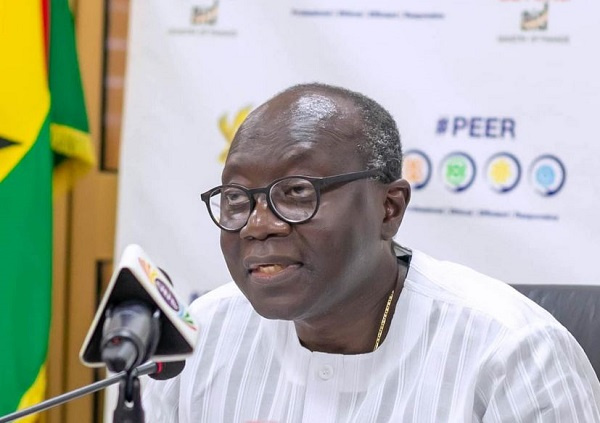The Finance Minister, Ken Ofori-Atta, is optimistic that the board of the International Monetary Fund (IMF) would approve the second tranche of the country’s deal with the Fund.
Speaking on the business edition of JoyNews’ PM Express, the Minister said he has engaged external creditors who have, in turn, given him positive assurances about the fate of Ghana’s debt restructuring programme in the coming weeks.
It is on the back of these, that Mr Ofori-Atta remains hopeful that the country would successfully get the Fund’s Board to approve the second tranche of its financial support. The IMF Board is expected to meet in November 2023, to consider the second tranche of $600 million for Ghana as part of the Fund-support programme.
“My deep sense is that we will get whatever is appropriate for the Fund Board to be able to make their decision in November. I am confident about it. And yes, we did meet with the officials from Paris Club and there was pretty positive assurance.
“I also had the opportunity to meet the Governor of the PPOC of China which is their central bank and his assurances were also very positive. So really, I am confident that we would get to the Board and it will approve our next tranche,” he told George Wiafe on Thursday.
Ghana is eagerly anticipating the arrival of its second tranche of financial support from the IMF. However, the country faces a hurdle as it is mandated to restructure its external debt as a prerequisite for the aid package. Failure to comply with this requirement could potentially lead to a delay in the disbursement.
Since the Covid-19 pandemic, Ghana has been grappling with the economic fallout which has exacerbated its fiscal challenges and elevated the importance of external financial support.
The IMF's assistance is therefore vital for stabilising the country's economy, addressing budget deficits, and mitigating the adverse effects of the pandemic on citizens.
On Wednesday, May 17, the first tranche – $600 million – of the $3 billion was credited to Ghana’s bank account.
The funds were used for the balance of payment and budget support, as well as to stabilise the foreign exchange rate and control inflation.
Latest Stories
-
‘In Mahama’s era students lacked chalk, but are now receiving tablets’ – Bawumia
8 mins -
Project commissioning not a ploy to attract votes – Oppong Nkrumah
10 mins -
CBG records GH¢1bn revenue in Q3
12 mins -
Mahama vows to create an agro-processing zone in Afram Plains
26 mins -
Political parties should plan for losses, not just wins – IGP advises
28 mins -
524 Diasporan Africans granted Ghanaian citizenship in ceremony
29 mins -
Mahama urges Afram Plains North residents to avoid ‘skirt and blouse’ voting
31 mins -
Asantehene receives more 19th century gold ornament and regalia
38 mins -
Hohoe Ghana Blind Union organises training for members ahead of Election 2024
45 mins -
Alan Kyerematen reveals his future plans for Ghanaian Health professionals
46 mins -
AAIN empowers women and small enterprises in Upper East Region through SHINE project
47 mins -
Akufo-Addo leads nationwide commissioning of 80 educational projects
53 mins -
Ghana and Seychelles strengthen bilateral ties with focus on key sectors
1 hour -
National Elections Security Taskforce meets political party heads ahead of December elections
1 hour -
Samsung’s AI-powered innovations honored by Consumer Technology Association
2 hours

